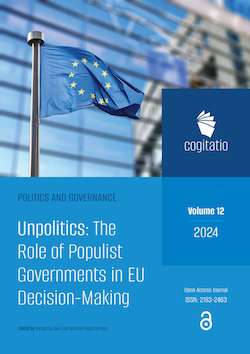Dans la même rubrique
- CEVIPOL
- FR
- Publications
- Articles
- Publiés en 2024
-
Partager cette page
Backsliding Populist Governments in the Council: The Case of the Hungarian Fidesz
By Ramona Coman
ÉDITION
Cogitatio Press
COLLECTION
Politics and Governance
LIEN
COLLECTION
Politics and Governance
LIEN

L’article fait partie de la special issue Unpolitics: The Role of Populist Governments in EU Decision-Making (2024, Volume 12) édité par Natascha Zaun and Ariadna Ripoll Servent.
Abstract
Populist governments aim to fundamentally challenge the EU, raising the question of when and how backsliding populist governments disrupt decision-making in the Council of the EU (hereafter Council). Due to their anti-elite and strong anti-EU stance, along with their opposition to core values of liberal democracy, I argue that these governments are more inclined to resort to unpolitics, understood as “unsettlement.” Analysing the behaviour of the Hungarian Fidesz government in the Council, the article demonstrates that populist governments resort to unpolitics but use an à la carte approach. Populist backsliding governments selectively oppose the Council’s formal and informal decision-making rules. Looking at the voting behaviour in the Council since 2009, the article shows that the Fidesz government preserves the norm of consensus. However, over time, it has become the government that has most often broken with this norm. Conversely, when it comes to “backsliding-inhibiting competences,” the Fidesz government challenges both formal and informal rules through a wide range of strategies, i.e., systematically contesting the legality of procedures and decisions, embracing a confrontational approach and diplomacy, self-victimisation, bending the truth, and accusatory rhetoric. To illustrate them, the article focuses on decisions related to the dismantlement of the rule of law in the country, such as Article 7 TEU, the application of Regulation 2020/2092, and the disbursement of Cohesion funds.
Mis à jour le 23 septembre 2024
